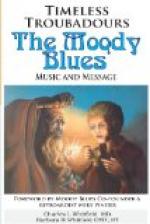Del rey engles me platz, quar es paue
coratjos,
Que manje pro del cor, pueys er valens
e bos,
E cobrara la terra, per que viu de pretz
blos,
Que.l tol lo reys de Fransa, quar lo sap
nualhos;
E lo reys castelas tanh qu’en manje
per dos, [104]
Quar dos regismes ten, e per l’un
non es pros;
Mas, s’elh en vol manjar, tanh qu’en
manj’a rescos,
Que, si.l mair’o sabra, batria.l
ab bastos.
“As concerns the English King (Henry III.) it pleases me, for he is little courageous, that he should eat well of the heart; then he will be valiant and good and will recover the land (for loss of which he lives bereft of worth), which the King of France took from him, for he knows him to be of no account. And the King of Castile (Ferdinand III. of Castile and Leon), it is fitting that he eat of it for two, for he holds two realms and he is not sufficient for one; but if he will eat of it, ’twere well that he eat in secret: for if his mother were to know it, she would beat him with staves.”
This idea, which is a commonplace in the folklore of many countries, attracted attention. Two contemporary troubadours attempted to improve upon it. Bertran d’Alamanon said that the heart should not be divided among the cowards, enumerated by Sordello, but given to the noble ladies of the age: Peire Bremen proposed a division of the body. The point is that Dante in the Purgatorio represents Sordello as showing to Virgil the souls of those who, while singing Salve Regina, ask to be pardoned for their neglect of duty and among them appear the rulers whom Sordello had satirised in his sirventes. Hence it seems that it was this [105] composition which attracted Dante’s attention to Sordello. The other important poem is the Ensenhamen, a didactic work of instruction upon the manner and conduct proper to a courtier and a lover. Here, and also in some of his lyric poems, Sordello represents the transition to a new idea of love which was more fully developed by the school of Guido Guinicelli and found its highest expression in Dante’s lyrics and Vita Nuova. Love is now rather a mystical idea than a direct affection for a particular lady: the lover is swayed by a spiritual and intellectual ideal, and the motive of physical attraction recedes to the background. The cause of love, however, remains unchanged: love enters through the eyes; sight is delight.
We must now turn southwards. A school of poetry had grown up in Sicily at the court of Frederick II. No doubt he favoured those troubadours whose animosity to the papacy had been aroused by the Albigeois crusade: such invective as that which Guillem Figueira could pour forth would be useful to him in his struggle against the popes. But the emperor was himself a man of unusual culture, with a keen interest in literary and scientific pursuits: he founded a university at Naples, collected manuscripts and did much to make




